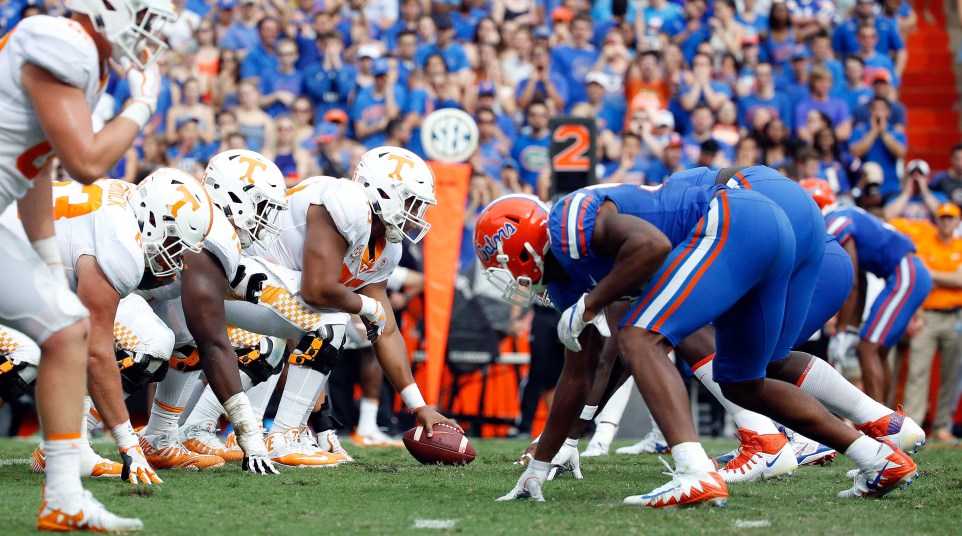
The season that forever altered the Tennessee-Florida rivalry
If you’re wondering when the Tennessee-Florida game took a massive turn from an elite rivalry to just a good matchup, look no further than 2001. That’s when everything changed.
When they meet again Saturday, it will be the 8th year in the past 11 that at least one of the teams isn’t ranked. It will be the third time in the past 5 years that neither team is.
But it wasn’t always like this.
That 2001 game was a joyous evening for the No. 5 Vols as they beat the No. 2 Gators 34-32 in Gainesville on Dec. 1. The entire game had an unusual feel. First, the normal September date had been postponed due to the tragic events of Sept. 11 earlier that season. Second, the Vols were given no chance to actually beat the Gators. UT was an 18-point underdog. However, the most intriguing aspect of the game was that it was a playoff game well before there was a College Football Playoff.
Whoever won that game in 2001 would advance to the SEC Championship Game to play LSU. Either UT or Florida would be favorite against the Bayou Bengals. A surefire win over the Tigers would lead to matchup in the Rose Bowl against Miami for a chance at a national title. The road was paved to Pasadena, but we’ll get back to that in a moment. Let’s stick with that memorable night in Gainesville.
After showcasing one incredible tailback after another for more than a decade, the Vols were forced to lean on Travis Stephens in 2001. Little was expected out of the 5-9, 190-pound tailback that season. Yet he delivered. Stephens set the single-season school record for rushing yards with 1,464. He ran for 226 yards and 2 touchdowns against the Gators in that season finale.
That game also seemed to be the moment in which UT defensive coordinator John Chavis had finally figured out Florida coach Steve Spurrier. Chavis and the Vols had beaten Florida before in 1998 at the height of Spurrier’s reign, but that victory was about an opportunistic defense that created turnovers when it absolutely had to and Jeff Hall’s right leg.
Chavis came out of his shell in 2001 by using what he would call a “Prowler” package. The defensive approach was based on keeping Florida’s offense off guard by constantly moving players around in the front seven. Even defensive linemen stood and bounced back and forth between gaps before the snap. UT’s defense still gave up 362 passing yards and 32 points, but the Vols kept the Gators guessing. Suddenly, Spurrier’s offense looked a bit antiquated. He refused to run the ball even though that seemed like the better option considering UT often just had one defender positioned to stop the run. Chavis knew that Spurrier wanted to win by throwing the ball. Spurrier played right into the Chavis’ hands.
Spurrier was soon reminded that high expectations could take the fun out of football. Despite winning 10 games in 2001, that season was deemed a failure by the Florida faithful. That didn’t sit well with Spurrier, so he resigned in January after 12 seasons. The key pillar that upheld one of the best rivalries in college football was gone.

Photo courtesy of University of Florida Athletics
The next pillar fell the following week. After beating Florida, the Vols returned to Tom Black Track to a throng of fans. There was even an impromptu radio broadcast waiting for the Vols. Then, there were the roses. Fans just assumed that UT would beat LSU and be off to the Rose Bowl. That surely didn’t sit well with LSU players and coaches.
The Vols lost what most would consider their most costly game in program history seven days later. Despite losing starting quarterback Rohan Davey and starting tailback LaBrandon Toefield, LSU whipped the Vols 31-20 in the SEC Championship Game. Turnovers and an inability to stop LSU’s running game undermined the Vols’ chances.
With Spurrier gone and UT losing to LSU, the rivalry between the two schools would never be the same. Just two times since that 2001 game have both teams been ranked in the top 10 at kickoff: 2002 and 2005, when Tennessee clearly didn’t belong.
The Vols started to trend downward. Some have blamed a lack of discipline at UT as the reason Tennessee slid for the next four years. Some have said recruiting slipped just enough to keep the Vols from a championship level. No matter the reason. The bottom fell out for the Vols in 2005 when they finished 5-6, their first losing season since 1988. Tennessee coach Phillip Fulmer was officially on the hot seat.
Florida continued to have success, especially with coach Urban Meyer, would won two national championships. The Vols made it back to Atlanta for the SEC Championship Game in 2007 only to lose to LSU — again.
The lean times for both programs forever changed the rivalry. The high rankings and high stakes all but disappeared. There wasn’t a season from that point forward where the old September classic seemed destined to determine the SEC East. What was once one of the elite rivalries in all of college football changed forever in 2001 — and it hasn’t come close to reaching those heights since.
